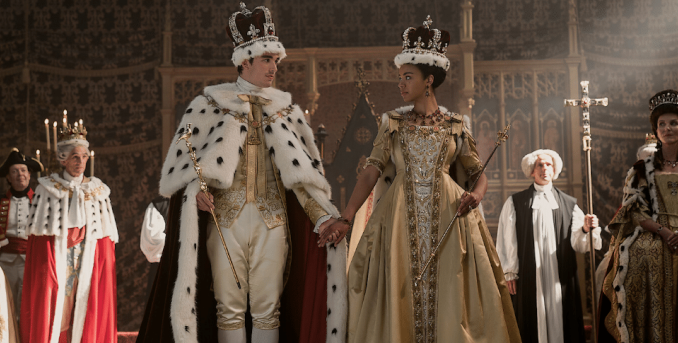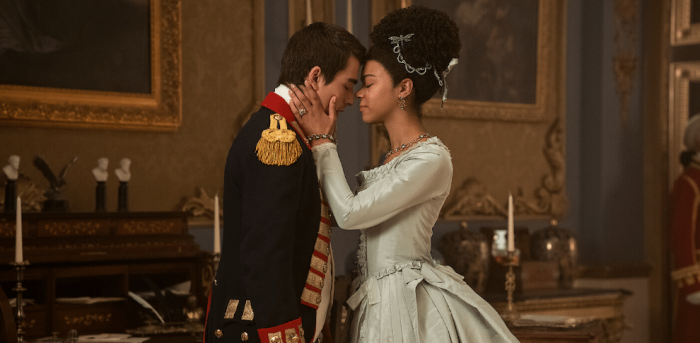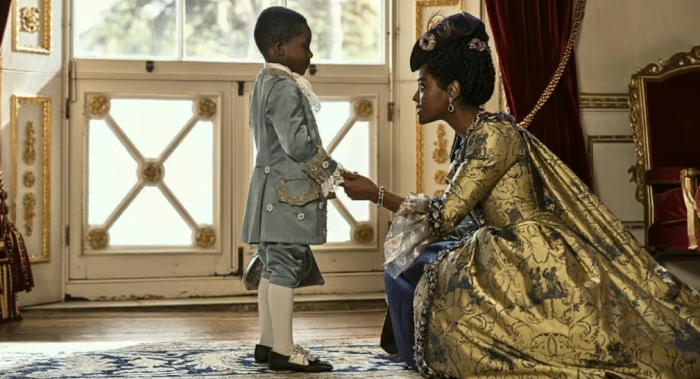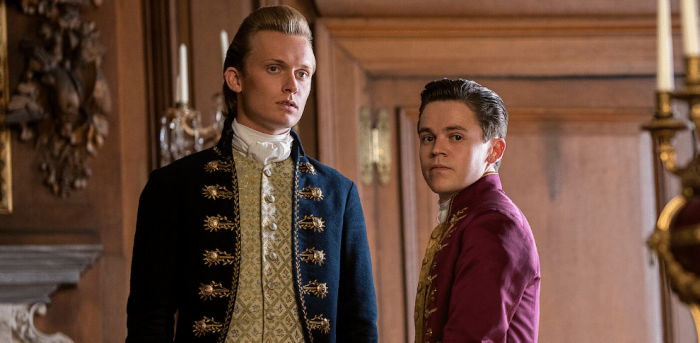
Historical romance is not remotely one of my preferred entertainment genres. I liked Pride And Prejudice And Zombies more than I liked Jane Austen’s original book. But I recently subjected my kid to Historic Williamsburg where there were many beautiful replica portraits of Queen Charlotte and King George hanging all over the place. Plus, there was that whole coronation thing that happened last week when England got its “new” King. So, I thought I’d give Shondaland’s shiny new show, Queen Charlotte: A Bridgerton Story, a try. For science.
I’m no dummy. I support Shonda Rhimes when I can. I do love a story about spirited young women who eschew decorum and custom to make their lives in gilded cages more livable. The fact that the show opens with Charlotte railing against the restrictive undergarments of the time spoke to me.
India Amarteifio as young Charlotte is a delight, balancing the youthful naïveté of a sheltered seventeen-year-old with the emotional intelligence necessary of a young woman thrust into a spotlight she did not choose for herself. As the story interweaves moments from her youth with moments from her older years I can see Amarteifio was perfectly cast to play the younger version of Golda Rosheuvel. Spot on, casting director. Bravo.
As an American, I am contractually obligated to prevent myself from feeling any soft or squishy feelings about mad King George III. However, I’m only second and third generation on my father and mother’s sides respectively. This means that I get to make an exception for Corey Mylchreest, who is serving strong Christopher Reeve vibes to me as the young sovereign beleaguered by psychiatric issues that no one knows how to treat, or even how to discuss.
The show does lean heavily into exploring George’s mental ailment(s). The fourth episode is devoted to revealing the secrets behind his erratic behavior with Charlotte and the torturous “remedies” Doctor Monro subjects him to as part of his “terrific method.” It also leans into the compassion and empathy Charlotte is capable of as she begins to understand the situation the two are trapped in together. When she steels herself to confront George’s mother, Princess Augusta (Michelle Fairley), truly stepping into the shoes of a Queen it’s an impressive showdown between two strong personalities who fear and hate each other with fiery passion. Although Augusta has arranged a wife for her son and paved the way for George to rule, she’s not quite ready to cut the apron strings. Or for there to be a Queen of England who reigns over her as well as the rest of the kingdom.

Equally as impressive and engrossing as a storyline is that of Arsema Thomas’ young Lady Agatha Danbury. This clever woman navigates a tightrope between her friendship with Queen Charlotte and her desire to secure a place in The Ton for herself and the other members of this first generation of Black aristocrats. Although it is believed that the real Charlotte of Mecklenburg-Strelitz was of mixed cultural heritage the British royal crown didn’t create an integrated court for her the way Princess Augusta does in the Bridgerton universe. In the show, it’s referred to as “The Great Experiment” and is used as a way for Princess Augusta and her Lords to make it seem like Charlotte was chosen as George’s wife because of the color of her skin — instead of being chosen in spite of it. Or really, without knowing it until she arrived. Awkward.
This “Great Experiment” could be a compelling investigation of race and class in the Bridgerton universe that I would have been interested in. But we don’t hear too much about it except at the Danbury Ball and then it becomes important to all of the Black aristocrats when Lord Danbury, Agatha’s much older husband, unexpectedly dies. In bed. With her. Also awkward.

Agatha and her husband were given titles when she was named as one of Queen Charlotte’s Ladies In Waiting. But because this is an experiment, there’s no precedent for peerage to be passed down among people of color. Her husband’s title may not be granted automatically to her son after his death. In fact, everything may revert back to The Crown. All of the other aristocrats of color are worried that their titles may be lost after one generation and task Agatha with mining Princess Augusta for information.
The Regent is cagey with Agatha and demands her allegiance, and that she report to her on Charlotte and George’s relationship. But Agatha is trying to foster a real friendship with Charlotte and doesn’t want to betray her or burden her with her own problems. It’s almost impossible for them to be honest with each other, as friends truly are, because there are just so many rules. They are rules that are new to Charlotte who doesn’t always understand the implications of breaking them.
Brimsley (Sam Clemmett) and Reynolds (Freddie Dennis), the royal footmen, are the real MVPs of the series. Keeping track of the courtly rules and manners everyone must adhere to in order to keep their relationships, palaces, and estates running smoothly. And keeping track of the important secrets that must be kept to protect The King, Charlotte, and their loooooooooooooooooooove.

They are the glue holding Charlotte and George’s early relationship together through the machinations and schemes they run in the background of their separate households. Plus, they’re an adorable, albeit super secret, couple. They deserve their own Bridgerton: Upstairs, Downstairs comedy spinoff, which I would gladly watch over another season of royal families making each other crazy.
If you love Bridgerton, and probably Downton Abbey, you’ll love Queen Charlotte: A Bridgerton Story. Did I enjoy this season? The costumes and sets were spectacular. All of the flower arrangements were stunning! There are some excellent, powerful performances and some low-key humorous moments. Is all of that enough for me to watch a second season? No. You can keep the whalebone corsets. I’m going back to my murder shows.
I will leave you with this: Alicia Keys and a 74-piece Global Orchestra made up entirely of women of color performing a rendition of “If I Ain’t Got You” on the 20th anniversary of the song.